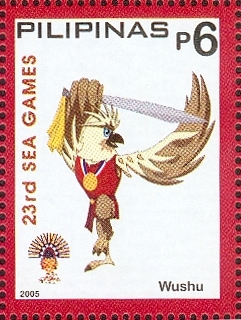| Women's nanquan at the 1990 Asian Games | ||||||||||
|---|---|---|---|---|---|---|---|---|---|---|
| Venue | Haidian Gymnasium | |||||||||
| Dates | 29 September | |||||||||
| Medalists | ||||||||||
| ||||||||||
The women's nanquan competition at the 1990 Asian Games in Beijing, China was held on 29 September at the Haidian Gymnasium. [1]
| Women's nanquan at the 1990 Asian Games | ||||||||||
|---|---|---|---|---|---|---|---|---|---|---|
| Venue | Haidian Gymnasium | |||||||||
| Dates | 29 September | |||||||||
| Medalists | ||||||||||
| ||||||||||
The women's nanquan competition at the 1990 Asian Games in Beijing, China was held on 29 September at the Haidian Gymnasium. [1]
| Date | Event |
|---|---|
| 29 October 1990 | Nanquan |
Only a few scores have been preserved.
| Rank | Athlete | Score |
|---|---|---|
| 9.80 | ||
| 9.56 | ||
| 9.35 | ||
| 4 | 9.31 | |
| 5 | 9.21 | |
| 6 | 9.05 |
The International Wushu Federation (IWUF) is an international sport organization and is the governing body for wushu in all its forms worldwide. The IWUF is recognized by the International Olympic Committee (IOC), and is also a member of the ARISF, GAISF, FISU, and the ISF.

Wushu at the 2005 Southeast Asian Games took place in the Emilio Aguinaldo College Gymnasium, in Ermita, Manila, Philippines.

Wushu, or Chinese Kungfu, is a hard and soft and complete martial art, as well as a full-contact sport. It has a long history in reference to Chinese martial arts. It was developed in 1949 in an effort to standardize the practice of traditional Chinese martial arts, yet attempts to structure the various decentralized martial arts traditions date back earlier, when the Central Guoshu Institute was established at Nanking in 1928.
The World Wushu Championships (WWC) is an international sports championship hosted by the International Wushu Federation (IWUF) for the sports of wushu taolu and sanda (sanshou). It has been held biennially since 1991 and is the pinnacle event of the IWUF. The World Wushu Championships also coincides with the IWUF Congress as well as with various committee meetings.
The 2008 Beijing Wushu Tournament was a wushu competition which was held from August 21 to 24, 2008 at the Olympic Sports Center Gymnasium in Beijing, China. The tournament was organised by the Beijing Organising Committee for the Olympic Games (BOCOG), the International Wushu Federation (IWUF), and the Chinese Wushu Association (CWA), and was held in tandem with the 2008 Summer Olympics.

The 2009 World Wushu Championships was the 10th edition of the World Wushu Championships. It was held at the Ricoh Coliseum in Toronto, Ontario, Canada from October 25 to October 29, 2009. This competition was also the qualifier for the 2010 World Combat Games. For the countries in Asia, this was also the qualifier for the 2010 Asian Games.
Hossein Ojaghi is a former competitive wushu athlete and sanshou kickboxer from Iran. He has had an impressive run as a competitive wushu athlete from the late 1990s to the late 2000s, and won medals in the Asian Games and the 2008 Beijing Wushu Tournament.
Yuan Wenqing is a former competitive wushu taolu athlete. Nicknamed 'the Prince,' he was known for his explosive speed and power, and won numerous national and international competitions. He was a world champion in 1993 and 1997, and is widely regarded as one of the greatest wushu practitioners of the late 1980s and the 1990s.
Wushu was contested by both men and women at the 1990 Asian Games in Haidian Gymnasium, Beijing, China from September 29 to October 4, 1990. The wushu competition consisted of three events: Changquan, Nanquan and Taijiquan, for both genders. The changquan combined event consisted of changquan, one long weapon discipline, and one short weapon discipline.
Dennis To Yu-hang is a Hong Kong martial artist and actor. He started his career as a wushu practitioner and won several awards at various competitions, including a silver medal at the 2002 Asian Games and a gold medal at the 2005 East Asian Games. He became an actor in 2007 and started by playing minor roles in Ip Man (2008), Bodyguards and Assassins (2009) and Ip Man 2 (2010). He is best known for his role as the Wing Chun grandmaster Ip Man in the 2010 film The Legend Is Born – Ip Man.
"Jayden" Yuan Xiaochao is a Chinese film actor, martial artist, and retired professional wushu athlete who was born in Shandong. He was a world champion in 2005 and 2007.

Lindswell, also known as Lindswell Kwok is a former Indonesian wushu taolu athlete who specialized in taijiquan. In 2013, she was named Best Athlete by the Indonesian Olympic Committee, and received the Dharma Sports Medal, the highest sports award in Indonesia.
Wushu at the 2015 Southeast Asian Games was held at the Singapore Expo Hall 2 in Tampines, Singapore from 6 to 8 June 2015.
The wushu competitions at the 2017 Southeast Asian Games in Kuala Lumpur were held at Kuala Lumpur Convention Centre.
Li Yi is a Macau female wushu practitioner of Chinese origin.
The men's changquan competition at the 2008 Beijing Wushu Tournament was held on August 22 at the Olympic Sports Center Gymnasium.
The men's daoshu / gunshu all-around competition at the 2008 Beijing Wushu Tournament was held on August 21 at the Olympic Sports Center Gymnasium.
Willy Reyes Wang is a former competitive wushu taolu athlete from the Philippines. He is one of the most decorated Filipino wushu athletes of all time in international competition and became especially renowned after his gold medal victory at the 2008 Beijing Wushu Tournament.
Wong Weng Son is a wushu taolu athlete from Malaysia. He is one of Malaysia's most renowned wushu athletes of all time.